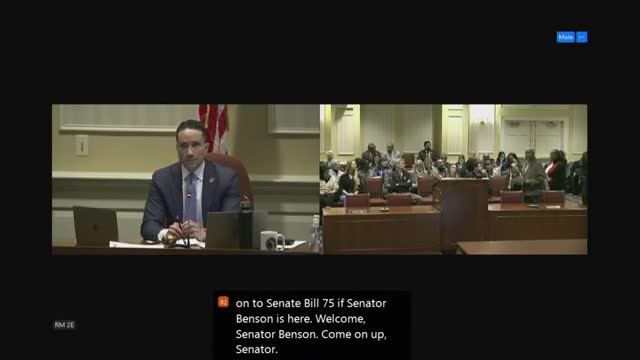Sen. Benson pitches Parental Accountability Act as tool to push juvenile supervision and wraparound services
Get AI-powered insights, summaries, and transcripts
Subscribe
Summary
Senator Antonio Benson on Tuesday asked the Judicial Proceedings Committee to advance SB75, the Parental Accountability Act, saying the bill would give judges additional authority to require parents of juveniles who repeatedly commit crimes to take part in supervision, counseling or community service and — where appropriate — face civil sanctions.
Senator Antonio Benson on Tuesday asked the Judicial Proceedings Committee to advance SB75, the Parental Accountability Act, saying the bill would give judges additional authority to require parents of juveniles who repeatedly commit crimes to take part in supervision, counseling or community service and — where appropriate — face civil sanctions.
“I'm here today to express my strong support for the Parental Accountability Act,” Benson told the panel, saying the measure grew out of community concerns in Prince George’s County over nighttime juvenile violence and chronic truancy. Benson described the bill as “not about punishing parents, but about empowering them” and said the measure includes “wrap around services, particularly fostering mental health and related support services.”
Nut graf: Benson framed the bill as a combined accountability-and-support approach intended to reduce juvenile delinquency and boost attendance and supervision; opponents warned the law duplicates existing juvenile and family court powers and risks unintended consequences for families.
Supporters said the bill would create an additional tool for judges to hold parents responsible when children repeatedly commit offenses and to require treatment and supervision tied to outcomes such as school attendance. During the hearing Benson and supporters referenced models used in other states and argued for alternatives to monetary fines — for example, community service — to avoid penalizing low-income families.
Opponents included the Office of the Public Defender. Robin Salter, Regional Director of Youth Defense at the Maryland Office of the Public Defender, urged an unfavorable report and told the committee the juvenile code already gives courts broad discretion to involve parents in proceedings, order services and impose sanctions including show-cause or contempt hearings. Salter said the juvenile system has existing treatment-service plans, mandated referrals for truancy, and mechanisms to compel parental participation, and argued the new law would be duplicative. She also noted that in some counties parents face prosecution for truancy and that judges already may order participation in services or impose sanctions when parents fail to cooperate.
Public testimony included a victim-witness account: Chrissy Costell described a violent attack on her fiancé by juveniles and argued laws that make interrogation of juveniles difficult leave dangerous offenders free. Costell told senators that police identified suspects and had “excellent evidence,” but that without parents or guardians to confirm identities, harassment and future violent incidents can continue. Committee members asked the witness and public defender witnesses follow-ups about whether juveniles involved in violent acts had prior Department of Juvenile Services contacts and about the availability and effectiveness of rehabilitative services.
Ending: The committee did not take an immediate vote on SB75; the hearing record includes written testimony on both sides and proponents said they will continue to press for a favorable report. The Office of the Public Defender filed written opposition and senators pressed for more details about program outcomes and how the bill would interact with existing juvenile-court practices.
